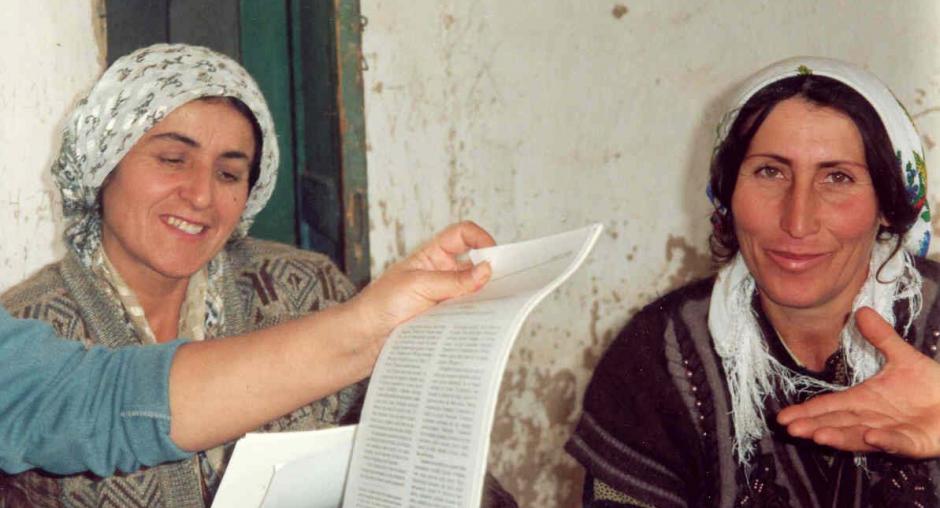Newsroom
Taking steps against discrimination of women in Tajikistan
DUSHANBE 7 August 2002

The OSCE Mission to Tajikistan organizes training session for women (Dinis Onofre) Photo details
DUSHANBE, 7 August 2002 - Participants in a roundtable on equality between men and women in Tajikistan have stressed the need for accessible and fast mechanisms for enforcing legal provisions. The roundtable, organized on 5 August by the OSCE Mission to Tajikistan, in co-operation with the UN Office of Peace-Building to Tajikistan (UNTOP), focused on the compliance of Tajik legislation with the UN Convention on the Elimination of all Forms of Discrimination Against Women (CEDAW).
Shanthi Dairiam, Director of the International Women's Rights Action Watch - Asia Pacific - facilitated the roundtable and discussed and presented, together with a national lawyer, preliminary findings on the compliance of the national legislation and its implementation mechanism. Besides the legislation, emphasis was given to governmental policies, special measures and the institutional framework. The analysis, findings and recommendations will be published in a report thanks to the financial support of the government of Switzerland.
There was a strong focus in the discussion on Tajikistan's national programme for ensuring equal rights and opportunities between men and women for the years 2001-2010, which was seen as the necessary framework for a progressive implementation of the convention. As affirmed by Ms. Dairiam, Tajikistan has strong institutional settings that would enable such a progressive implementation.
Shortcomings were pointed out in the absence of an equality act that would operationalize the constitutional guarantee on equality; in the criminal code not fully protecting particularly domestic violence and in the absence of temporary special measures for the most vulnerable layers of society, in particular female-headed households, by guaranteeing them facilitated access to key resources. A lively discussion was held on the family code and on the problem of women not being guaranteed a range of civil rights in unregistered marriages.
In general, the national legislation was considered as progressive, however, a strong need for accessible and fast mechanisms for enforcing the legal provisions particularly on the local level was pointed out.
The Republic of Tajikistan ratified the CEDAW convention in 1993 but so far has not presented a report on the convention's implementation. With the creation of a National Commission on Human Rights at the beginning of the current year, the Government is undertaking the fulfilment of its obligation under the main human rights treaties.
Shanthi Dairiam, Director of the International Women's Rights Action Watch - Asia Pacific - facilitated the roundtable and discussed and presented, together with a national lawyer, preliminary findings on the compliance of the national legislation and its implementation mechanism. Besides the legislation, emphasis was given to governmental policies, special measures and the institutional framework. The analysis, findings and recommendations will be published in a report thanks to the financial support of the government of Switzerland.
There was a strong focus in the discussion on Tajikistan's national programme for ensuring equal rights and opportunities between men and women for the years 2001-2010, which was seen as the necessary framework for a progressive implementation of the convention. As affirmed by Ms. Dairiam, Tajikistan has strong institutional settings that would enable such a progressive implementation.
Shortcomings were pointed out in the absence of an equality act that would operationalize the constitutional guarantee on equality; in the criminal code not fully protecting particularly domestic violence and in the absence of temporary special measures for the most vulnerable layers of society, in particular female-headed households, by guaranteeing them facilitated access to key resources. A lively discussion was held on the family code and on the problem of women not being guaranteed a range of civil rights in unregistered marriages.
In general, the national legislation was considered as progressive, however, a strong need for accessible and fast mechanisms for enforcing the legal provisions particularly on the local level was pointed out.
The Republic of Tajikistan ratified the CEDAW convention in 1993 but so far has not presented a report on the convention's implementation. With the creation of a National Commission on Human Rights at the beginning of the current year, the Government is undertaking the fulfilment of its obligation under the main human rights treaties.
